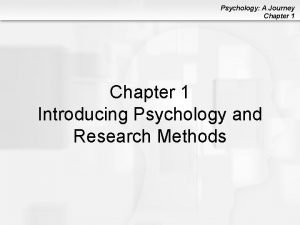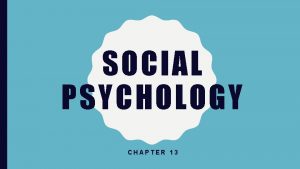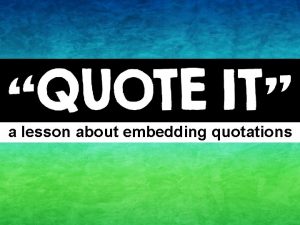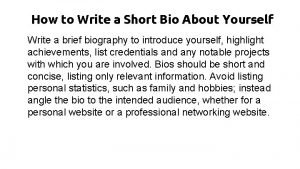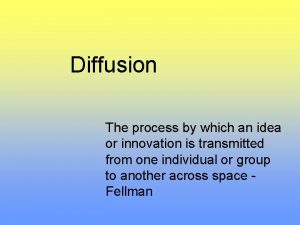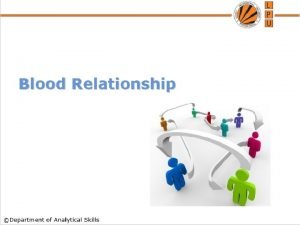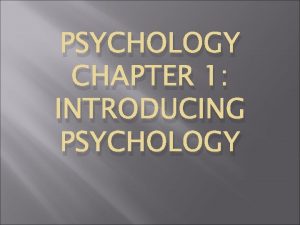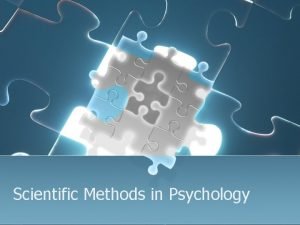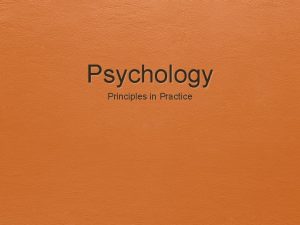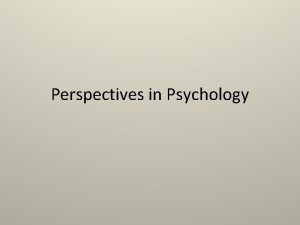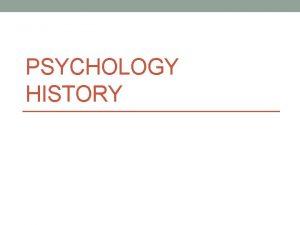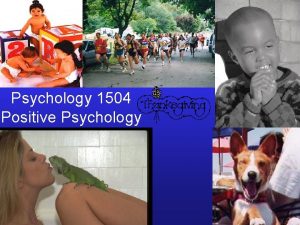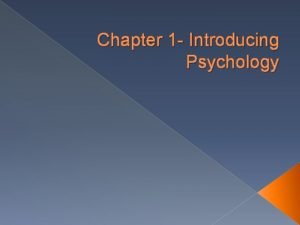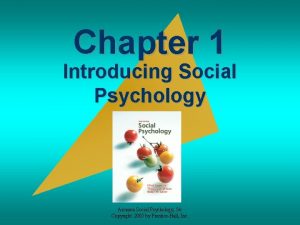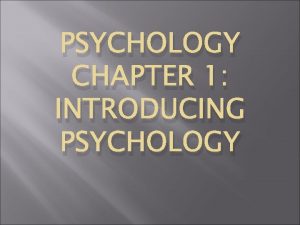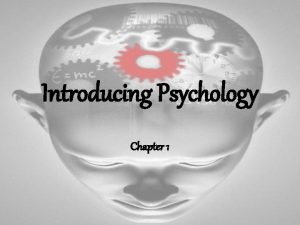CHAPTER 1 INTRODUCING PSYCHOLOGY PSYCHOLOGY Def the scientific

























- Slides: 25

CHAPTER 1: INTRODUCING PSYCHOLOGY

PSYCHOLOGY �Def: the scientific study of behavior that is tested through scientific research �Both human and animal �Study of behavior must be systematic

GOALS OF PSYCHOLOGY � 1: Description � 2: Explanation: introduced as hypotheses; become theories � 3: Prediction � 4: Influence: through basic science (research) and applied science (practice)

SECTION 2: A BRIEF HISTORY OF PSYCHOLOGY

ORIGINS OF PSYCHOLOGY �Began with Greeks � 17 th century philosophers promoted the idea of Dualism: body and mind are separate and distinct �Rene Descartes proposed a link existed between the mind and body

HISTORICAL APPROACHES

WILHELM WUNDT �Wilhelm Wundt starts Laboratory of Psychology in Leipzig, Germany (1879) �This establishes modern psychology as a separate field of study

STRUCTURALISM �Wundt’s approach �Wanted to study the basic elements that make up conscious mental experiences �Had students use introspection � 1 st systematic approach in psych

FUNCTIONALISM �William James—father of psychology in the U. S. �Focused on the function of consciousness �Believed thought processes helps survival of our species

INHERITABLE TRAITS �Sir Francis Galton �Studied how heredity influences abilities and behavior �Studies extremely flawed �Started the nature vs. nurture debate in psychology

GESTALT PSYCHOLOGY �Max Wertheimer, Wolfgang Kohler, and Kurt Koffka �Argue perception is more than the sum of its parts �Study how sensations are assembled into perceptual experiences � 1 st cognitive approach to psychology

CONTEMPORARY APPROACHES

PSYCHOANALYTIC PSYCHOLOGY �Sigmund Freud �Wanted to study the influence of the unconscious on behavior �Used free association— patient says whatever comes to mind �Urged the study of dreams �Wrote The Interpretation of Dreams

BEHAVIORAL PSYCHOLOGY �Ivan Pavlov �Pavlov’s Dogs experiment �Believed in the study of the observable �John B. Watson �B. F. Skinner: no free will and idea of reinforcement

HUMANISTIC PSYCHOLOGY �Abraham Maslow, Carl Rogers �Believe each person has freedom in directing their future and achieving personal growth

COGNITIVE PSYCHOLOGY �Jean Piaget, Noam Chomsky, Leon Festinger �Focus on how we process, store, retrieve, and use information and how cognitive processes influence our behavior

BIOLOGICAL PSYCHOLOGY �Psychobiologist: studies how physical and chemical changes in our bodies influence our behavior �Neurotransmitters and genetics

SOCIOCULTURAL PSYCHOLOGY �Newest approach �Study influence of cultural and ethnic similarities and differences on behavior and social functioning �Concerned with gender, ethnicity, and socioeconomics

SECTION 3: PSYCHOLOGY AS A PROFESSION

WHAT IS A PSYCHOLOGIST? �Def: someone who studies the mind and behavior of humans/animals �Usually have a Ph. D. �Psychiatry: branch of medicine that deals with mental, emotional, and behavioral disorders �Have an M. D.

TYPES OF PSYCHOLOGISTS � Clinical psych: diagnoses and treats people with emotional disturbances � Counseling psych: helps people deal with problems of living � Developmental psych: study the emotional, biological, personal, and social changes that occur through maturation

TYPES CONTINUED �Educational psych: concerned with helping students learn �Community psych: work in a mental health or social welfare agency �Industrial/Organizati onal psych: make the workplace more satisfying

MORE TYPES � Environmental: study effect of environment on people � Forensic psychs: legal, court, and correctional facilities � Health psychs: study interaction between physical and psychological health factors � Experimental psychs: perform research in carefully controlled labs

AMERICAN PSYCHOLOGICAL ASSOCIATION �APA �Founded 1892 � 54 divisions, each representing a specific field �APA works to promote human welfare and the profession

MARY WHITON CALKINS � 1 st female president of the APA �William James was her mentor �Harvard refused to give her a Ph. D.
 Operational definition of affection
Operational definition of affection Government in america chapter 1
Government in america chapter 1 Information gathered during an experiment
Information gathered during an experiment How is a scientific law different from a scientific theory?
How is a scientific law different from a scientific theory? Psychology chapter 13 social psychology
Psychology chapter 13 social psychology Quotation signal phrases
Quotation signal phrases A concise introduction to linguistics
A concise introduction to linguistics Introducing james joyce
Introducing james joyce Sentence starters for quotes
Sentence starters for quotes How do you write a counterclaim
How do you write a counterclaim Introduce yourself interview
Introduce yourself interview Warm up introducing yourself
Warm up introducing yourself Introducing family members in french
Introducing family members in french Diamante examples
Diamante examples Introduction about
Introduction about Company profile of kfc
Company profile of kfc Integers essential questions
Integers essential questions Introducing internet
Introducing internet Mla format quotes
Mla format quotes Introducing new market offerings ppt
Introducing new market offerings ppt Templates for explaining quotations
Templates for explaining quotations Introducing windows 7
Introducing windows 7 Who invented the metric system
Who invented the metric system Writing a short bio about myself
Writing a short bio about myself Diffusion the process of introducing cultural
Diffusion the process of introducing cultural Blood relation definition
Blood relation definition
